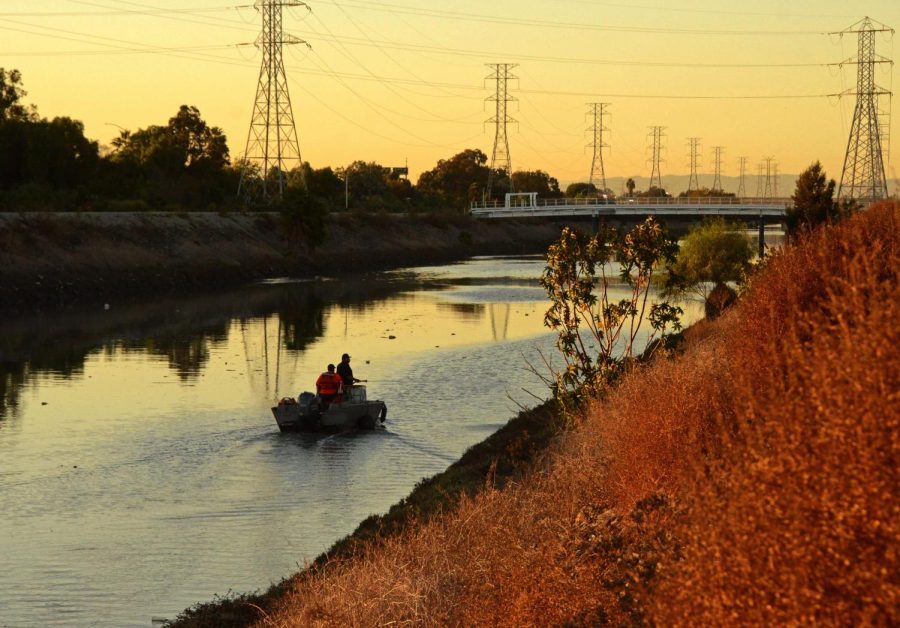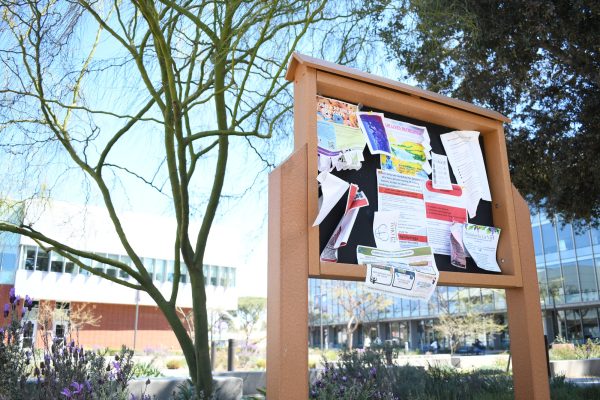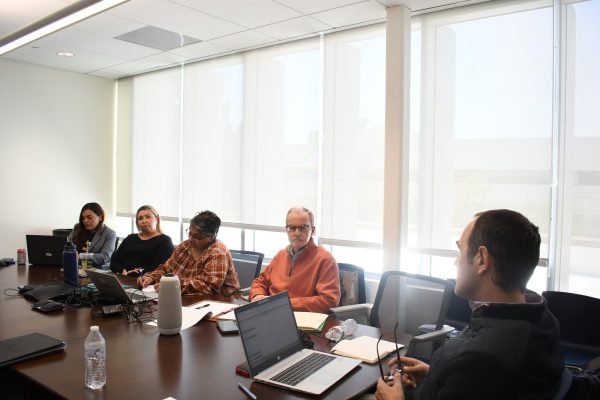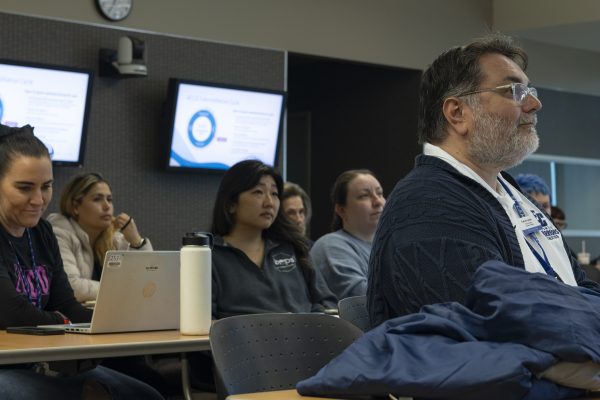‘Rotten’ odor in Carson frustrates residents
Workers from the Ocean Blue Environmental Services, Inc., spray the Dominguez Channel with Epoleon, an odor neutralizer that converts hydrogen sulfide into salt, just off Chico and 213th street in Carson on Saturday, Nov. 13. Photo by Jose Tobar/The Union
On Oct. 7, the City of Carson was flooded with an odor of an unknown source, with local residents describing the odor as being similar to rotten eggs, sewage and farts.
A rapid growth of bacteria using anaerobic digestion to process organic materials was the main reason why the mass of water lacked oxygen. A result of the anaerobic digestion is that the hydrogen sulfide causes an odor that is often compared to rotten eggs or sulfide.
The Director of Public Works Los Angeles, Mark Pestrella said at the City Town Hall meeting on Nov. 9, 2021, “On Oct. 7, Public Works was notified that a foul odor was emanating from the Dominguez Channel, and upon investigation, we discovered 90-acre feet, or about 90 Rose Bowls full of one foot of water within an estuary with zero dissolved oxygen.”
Researchers were able to determine how low the dissolved oxygen level is in the channel.
“When we tested the water column we found it had been impacted to a point where again the dissolved oxygen concentration was as low as 0.1 milligrams per liter, mainly due to high chemical oxygen demand,” Pestrella said.
While there were low levels of dissolved oxygen found, the water contained high levels of other elements.
“We also found high levels of acetone at 9.6 milligrams per liter and sulfides at 80 milligrams per liter these are products of anaerobic digestion and they are again indicators that the water quality was very poor in this area,” Pestrella said.
The smell was prominent and difficult to ignore as it was noticeable by both Carson City residents and for people passing through Carson on their daily commutes to work or school, including students and faculty at El Camino College.
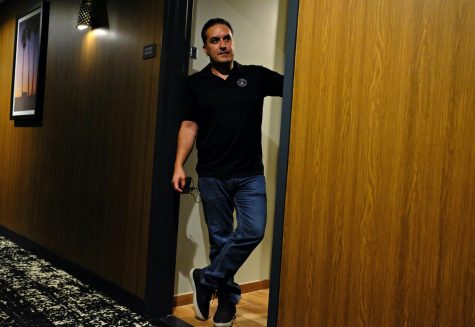
“I have never smelled something like it. I mean, if there was a corpse rotting, it would probably smell better than the odor here in Carson,” real estate faculty member and professor John Yeressian said.
Community members at ECC have also drawn different conclusions upon noticing the odor for the first time.
“I came home from work one day around like eleven, forty-five or so, basically midnight. And I thought one of my neighbor’s pipes had burst or something because just as soon as I got out of my car when I got home, it just smelled so strong and awful in the air,” El Camino College alumni and realtor, Zachary Noble said.
Yeressian said the strong smell began penetrating his clothing to the point that washing them would not remove the smell. The odor would also affect the way that people socialize due to the discomfort of the smell coming from their clothes.
“Everything smelled like it. I work deeper into Torrance at a little brewery as well on the side, and I walked in with just my clothes reeking. It just smelt. And so everyone’s like, ‘What dude you smell terrible.’ And that’s a huge insult.
Not only did the smell affect people’s daily lives, but it was also affecting their health. Many Carson residents started experiencing symptoms including headaches, nausea, vomiting, and/or diarrhea, after smelling hydrogen sulfide constantly.
“After the third day of the smell 24/7, I started having constant headaches, and then I started getting vomiting and nausea. It started going up and I am trying to do class and I am getting sick, like not feeling well during classes, during zoom meetings, during anything work-related.” Yeressian added.
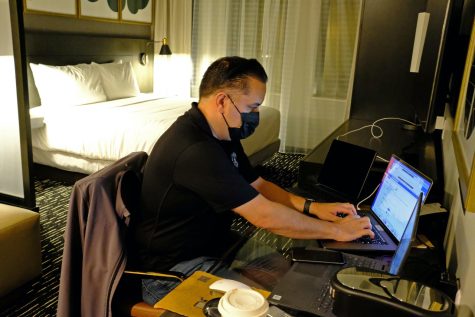
The severity of side effects depended on where the person lived, how strong the smell was and the sensibility to hydrogen sulfide the person has. Some people like Yeressian, who suffered multiple symptoms from constant contact with the odor were asked to be relocated.
The Los Angeles County of Public Works advised residents to either buy air purifiers or relocate to avoid contact with the substance in the air. The Carson City Council is currently offering reimbursement for hotels and air purifiers since they are the only two ways to either prevent or improve contact with hydrogen sulfide.
“You can remain in those hotels, we want you to, we are also attempting to reach out to you. If you are one of those residents who are been relocated and getting that information, you certainly can call our 211 lines to get information from the county. We are proposing to do is have those residents move to the county’s relocation program so that we can consistently serve you and your needs.” Pestrella said.
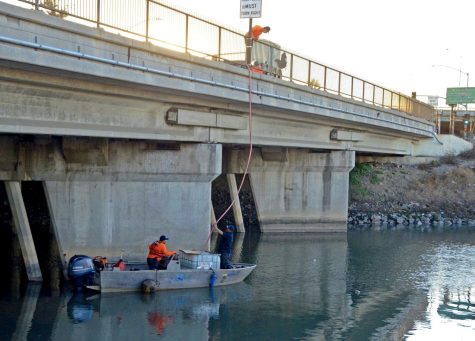
In the beginning, Carson showed levels of 350 PPM (Parts Per Million) and now the level decreased to 30. According to the United States Department of Labor, for hydrogen sulfide to be “immediately dangerous to life and health,” also identified as IDLH, levels of hydrogen sulfide must be at 100ppm or higher.
Even though Pestrella announced that the estuary of the Dominguez Hills canal will be back to normal in two years during the Council Town Hall meeting, the hydrogen sulfide levels have been reducing significantly. Decreased levels in hydrogen sulfide reduces the smell and therefore, reduces the distress to Carson’s residents.
“I mean, usually I’m gone during the days, but during the bulk of the day, smelt normal air, smelt fine, clean. It was as soon as it started becoming night that it started to really smell bad. And then, yeah, in the mornings, not anymore,” Noble said. “Luckily, I don’t smell it anymore at all. But that’s how it was for a couple of weeks here, maybe longer than a couple of weeks.”
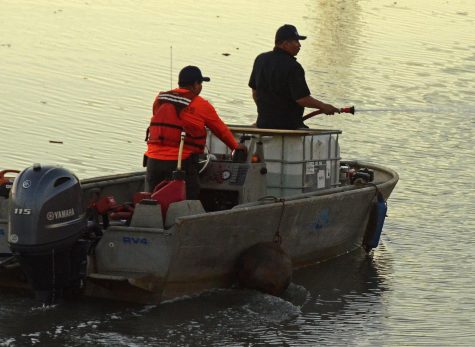
Editors Note: Fixed a glitched photo caption Nov. 28 at 10:12 a.m.
Corrected attribution mistakes regarding the County of Los Angeles and City of Carson Dec. 1 at 3:03 p.m.
Editor’s Note: Resized photos for readability, Dec. 6 at 11:55 p.m.


